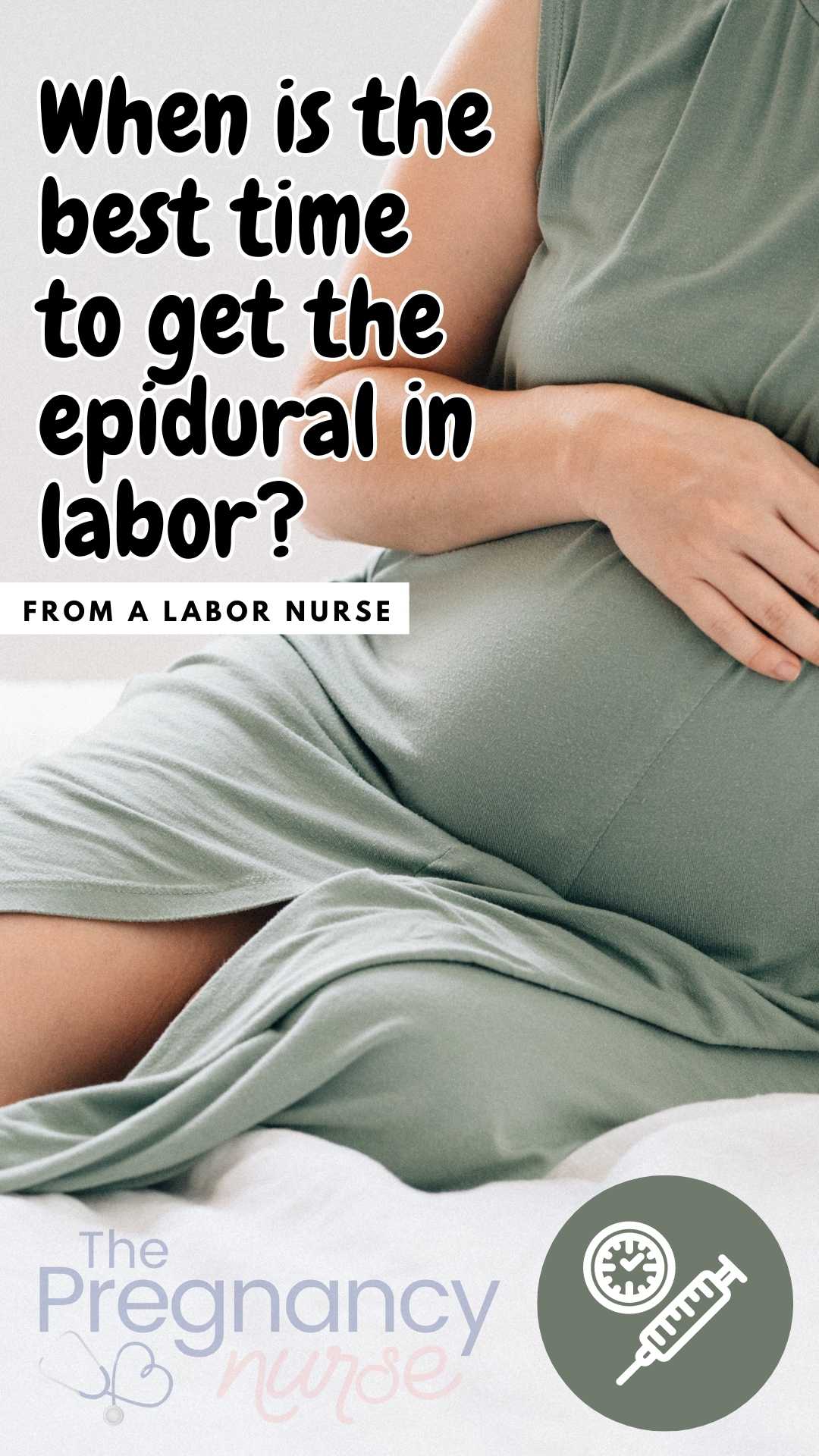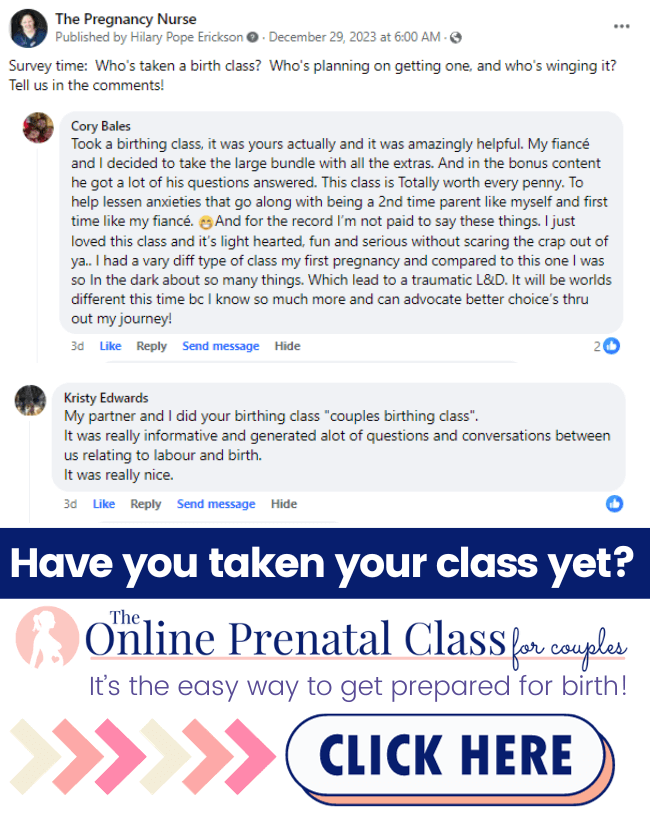When is the best time to request epidural anesthesia? Will getting it earlier or later prolong labor or cause other issues? How can you make the choice it is time for the epidural?

Hi — I’m Hilary — The Pregnancy Nurse 👩⚕️. I have been a nurse since 1997 and I have 20 years of OB nursing experience, I am also the curly head behind Pulling Curls and The Online Prenatal Class for Couples. 🩺 I have helped thousands of families be admitted to the hospital to have their baby — I would call myself an expert on this one — so, let’s jump in:
I also did a podcast that answers some of people’s most burning questions about epidural analgesia (including this one):
And, I have a video all about when the best time to get the epidural is:
Keep in mind the epidural is meant to help with the pain of labor, mostly in the lower half of your body. This regional anesthesia is often requested by women in the United States to help their labor. I would encourage you to talk to your healthcare provider in advance about any medical conditions you have that might prove problematic in the epidural placement.
Remember that the epidural just one of the pain relief options available to you.
This is part of my Complete Guide to Epidurals — so if you have more questions don’t miss that!
When is the Best Time to Get Your Epidural?
The studies point to this fact:
The best time to get an epidural is when the mother requests it
The study randomly assigned women to get it early or late. Of course, that is different than the hospital environment where we give the epidural when you ask for it.
In my 20 years of practice, I do think there is a correlation between women who ask super early epidurals (before 3 cm – so in early labor) and those who get a caesarean section.
That being said, would those women have gotten a cesarean either way? Perhaps labor was more painful because the baby’s positioning? Correlation does not represent causation, an do believe the right time is up to each mom.
Also, keep in mind that study didn’t let women get it until 3 cm. Meaning, they were in active labor (or close to it).
FYI, if you’re interested in more information on pain management during labor, The Online Prenatal Class for Couples there is an entire chapter on pain management options and a bonus video on natural pain management. The course can be done in about 3 hours (or much longer as I have lots of options to dive deep into). Includes video, text, quizzes, pintables and couples questions to get you on the same page!
When should you ask for your epidural?
When patients ask me when it’s best to get it — I have a few rules I share:
You should be progressing
Your cervix should be opening before we give an epidural. Most people call this active labor (learn more about the phases of labor). Now, that might not be the case in a medically necessary induction (especially at 37 weeks — as that can be a painful uphill battle).
Why? Because we want to be sure you’re actually in labor? If you come in, and you’re 2 cm — we aren’t going to give an epidural because we aren’t sure you’re actually staying at the hospital. We will encourage movement and hydration (both great either way). If we check you again in an hour, and you’re 3 cm — then that opens up the epidural.
And, if you get an epidural and then labor peters out, it does require medical intervention to get it going again — which may not be something you want.
I have sent a patient home who had an epidural. She just didn’t end-up in labor. She was still not due, and we didn’t find it worth it to basically induce labor when the baby could stay inside a bit longer.
We turned-off the epidural pump, let it completely wear-off and we sent her home. She came in a week or two later in labor.
That is a scenario we’d like to avoid — so it is important for us to know you are in labor before we give an epidural. Although, I used to be jealous of epidurals that I’d give as approached 40 weeks as a pregnant labor nurse. 🙂
Remember there other things you can have. If a woman requests pain relief early, we will often offer IV pain medicine or nitrous oxide to help you continue to have more movement early in labor.
You should be in pain
Because we want to make sure that you’re in actual labor, that usually means that you’re in pain before you get it. We’ll talk more about when to request an epidural before an induction, but that’s different.
That being said – I will just inform you of the risks and benefits of getting it early, and you can make the choice. The choice is mostly always up to you.
Except in this case…
You need a doctor’s order
I am grateful that in the last half of my career, the doctors have been very lenient as to when women could get an epidural. However, the first 10 years there were very strict rules that doctors set-up about when a woman could get the epidural.
Which, basically just required us to fudge a few vaginal exams when a woman was desperate for pain relief.
I hear that in most areas doctors are allow epidurals “whenever” (within reason obviously) — but you might want to check with your provider as your next visit.
Consider the pain RIGHT NOW
What is the pain like right now? Don’t get an epidural anticipating huge pain in a few hours.
While the epidural does take some time to get set-up — there isn’t a compelling reason to get an epidural out of fear of what the pain will be like in a few hours.
The good news is that you’re in the hospital and we can do a lot of things to manage your pain — so just keep that in mind!
That being said…
Consider what’s going to happen
If your doctor is coming in to break your water (be sure to obtain informed consent before it — to make sure that’s what you want) — you might want to consider getting it before then. Especially if you are in a good amount of pain right now.
Once your water breaks, the contractions tend to get more painful. Think of it as a full water balloon, and when it breaks, you can squeeze a lot tighter, right? Very often, people start to want pain medication after their water breaks.
If I know a practitioner is coming to break water, I will always try to inform my patients in advance so they can make the choice for themselves.
Let your nurse know
If you know you want an epidural, and especially if you’re starting to get quite uncomfortable — let your nurse know.
If something is likely to head for a cesarean section, often I will try to get a patient an epidural before that other patient goes into surgery.
During the time that the patient is in surgery, our anesthesiologist is tied up and can’t come place the epidural.
They can sometimes call a colleague to come do it.
Also, at busy hospitals you might have to get in “line” to get your epidural.
You can always ask the nurse what she thinks and if there is a back-up on epidural placements.
BTW if you’re nervous about the epidural placement, I go through the entire thing and what to expect during each step of it in The Online Prenatal Class. Get prepared in just three hours, together!
When to Get an Epidural During an Induction
I, personally, still think the same rules apply,
- Be more than 3 cm (per that study that started at 3 cm)
- Be in a good amount of pain right now (not anticipating pain in the future)
- Try to move as much as you can, even if it’s at the bedside, prior to the epidural
However, sometimes people really don’t want to feel pain, and I do have a whole post on if you can get your epidural before your induction << so be sure to check out that post.
Also, inductions have a lot more intricacies, and taking a prenatal class is extra important in that case.
How soon to get an epidural after pitocin?
It would vary depending on how many CM’s you were before you got the epidural, and how your body takes to the medication, so ask your nurse when they think is best.
Nurses are a wealth of information, so don’t hesitate to ask them when they think would be the best time to get it. I’d never hesitate to tell a patient what I thought (but tried to only do it when they asked).
Is it better to get the epidural early or later?
Personally, with my experience, I recommend people wait til’ at least for 4 cm to get it. I just think that having your full range of movement prior to then is super helpful and aids baby finding their best spot.
However, the studies point to there not really being a difference (after 3 cm).
How long does it take an epidural to “work”?
The epidural itself works quite quickly. But, the timeline can look like this (depending on your hospital, and availability of anesthesia):
1 – Patient requests an epidural
2 – Anesthesia has up to 30 minutes to get to the room, often it is quicker, but sometimes it is not, and if they’re in a room with other patients it can be longer.
3 – Epidural placement and informed consent takes about 20-30 minutes. FYI, it is a lot of prep (where they clean the injection site) and drawing up medications, etc.
4 – Then, they give you a local anesthetic in your lower back, to numb you, and then they find the epidural space with the epidural needle. During this, the nurse will frequently be taking your blood pressure. They then place medication in that space using an epidural catheter. The whole thing is termed an epidural block. It’s meant to take away about 80% of labor pain.
Then, within 15-20 minutes of that you should feel fairly numb (but not 100% numb) from about your bra line through your lower body.
Most often I tell patients it will be about an hour before they are feeling great.
That being said, sometimes anesthesia has an easier or harder time with the epidural placement. So, that time can certainly vary.
They do need to be very careful, there are obviously risks with an epidural — the largest one being a severe headache, called a spinal headache (also called a post-dural puncture headache). This is when a small amount of spinal fluid leaks out due to the needle going in too far before they place the epidural medication.
While the epidural is not placed near your spinal cord, it is clearly near that spot, and is meant to numb the spinal nerves. There can be rare cases with other problems (like permanent nerve damage which is EXTREMELY RARE) — so be sure you listen to the provider as they tell you the risks and benefits of the epidural.
Other common side effects women report include shaking and itching.
In the end you have a small tube taped up your back and hooked to a small pump that pushes medication into your back for continuous pain relief until it is turned off..
How late is too late to get an epidural?
You can ask for an epidural at any point. But, our response may be different based on how many babies you’ve had:
First Baby Epidural
First time mothers can really get an epidural whenever. Even if you’re at 10 cm you’ll still likely have a good 2 hours (on average) of the pushing stage in front of you. If you want an epidural, let’s do it.
Keep in mind that once you start to push it can feel very different and you might be OK without it.
Also, remember there are other options including IV pain medicine and nitrous oxide at some hospitals.
Second Baby Epidural
When you’ve already had a baby you will not push as long. Also, the last few centimeters often happen much faster than the first centimeters.
Late epidurals can sometimes be placed but sometimes don’t have time to work if you’re having the baby quickly.
At around 8 or 9 cm it is unlikely the epidural will give you a lot of relief, and with proper breathing relaxation you might be able to have the baby before the epidural would even start to work (plus you wouldn’t have to hold still for the placement and risks an epidural would entail).
That being said, if my patient wants a late epidural and is 9 cm, I will still call anesthesia. We will give it an effort, see if we can get it in. Sometimes it works. Sometimes we sit you up for placement and the baby starts to come out. Honestly, a win-win either way for you!
How Many CM’s is Too Late for an Epidural?
As I said above, it’s mostly based on how many babies you’ve had:
- First baby: You can get it even when you start pushing
- Second Baby: About 8 cm you’re getting too late.
When to get an epidural FAQ’s
Epidurals are used for labor, and most often a spinal is used for a cesarean (in pregnant women). I have a whole post on spinals vs epidurals.
Some studies do show that there is some reaction to your body for the pain signals of the epidural. However, this article confirms with a study that epidurals do not slow down labor.
Epidurals can still be helpful, even if you don’t have them a long time. It can still give you a great birth experience!
Often, even if we get the epidural at 9 cm doesn’t have time to provide a lot of pain relief before the baby comes out.
Hopefully this gave you some idea of what to expect. Be sure to check out my online class, and get started today!
Looking to get prepare for your birth? I have some easy options for you!
~~~~~~~~
– Worried you’re missing something? Grab my pregnancy planner so you don’t miss a thing!
– Thinking about an induction? Grab Inductions Made Easy to feel prepared in just 20 minutes!
– Wondering how to get that baby OUT? Grab Going Into Labor Made Easy so you know how to (and not to) do it!
– Postpartum got you anxious? Check out Postpartum Care Made Easy so you can stay SAFE even when all your attention is on that little on.
🚨 AND if ALL OF IT has got you on edge The Online Prenatal Class for Couples is perfect for you — You’ll feel so ready before you even know it!
~~~~~~~~
No matter WHERE you are at in your pregnancy journey, we have resources that can help!
And, if you’re not quite sure you’re ready for that whole thing, check out my free prenatal class. It’s your first step toward getting in the driver’s seat of your birth.










 Feel Baby Move in Lower Abdomen: 20 Weeks Pregnant
Feel Baby Move in Lower Abdomen: 20 Weeks Pregnant

I just had my first baby 5 hours ago! I didn’t request the epidural until I was 7cm dilated, and by then my contractions were coming on so thick and fast I could hardly sit still for the placement….and that meant it was poorly placed and didn’t work…..so I’d say I was too late with the epidural! If I do this again, I’ll request it before I am writhing in pain every 60 seconds!
Oh no… that’s no good. Good advice!
Hey, my name is Samantha and I’m 22 years old and currently 33 weeks pregnant. I would like to ask you this question to see if you might know anything about it.
About a year and a half ago roughly, I was on a walker and cane, almost ended up wheelchair bound all due to diabetic neuropathy, Well I am 95% recovered from the neuropathy but still have some pains once in a while and balance issues and still don’t have all my strength back in my legs. Like 80% strength back probably? Anyways, I am sooo much better but it’s still there and I am really nervous and scared that if I get my epidural this time I will backslide from it, like I’m afraid the epidural will bring back my neuropathy where I cannot walk again or it will at least make it worse in some way. Like my body won’t remember how to walk and balance itself once it has no feeling. Like it won’t remember what it should or something.
Have you ever seen something like this happen to someone? Or do you have any idea if it is possible for this to happen? Or am I just freaking myself out?
Cause I would highly consider changing my birth plan if an epidural could effect me negatively in the area of my neuropathy coming back.
I have asked a few different kinds of doctors about this before and none of them either understood what I was asking or just didn’t know. So I thought what the heck might as well ask you and see if you knew or could possibly find out?
So what do you think?
Thanks for any info!!
I would ask for an anesthesia consult ahead of time. THey can be HARD To get, but it should be a possibility. Push your doctor to find out how you can speak with one of them ahead of them. Honestly, I doubt it would affect it, but I don’t really know. I hate that talking with anesthesiology in advance is so hard, but it is… maybe your hospital makes it easier.